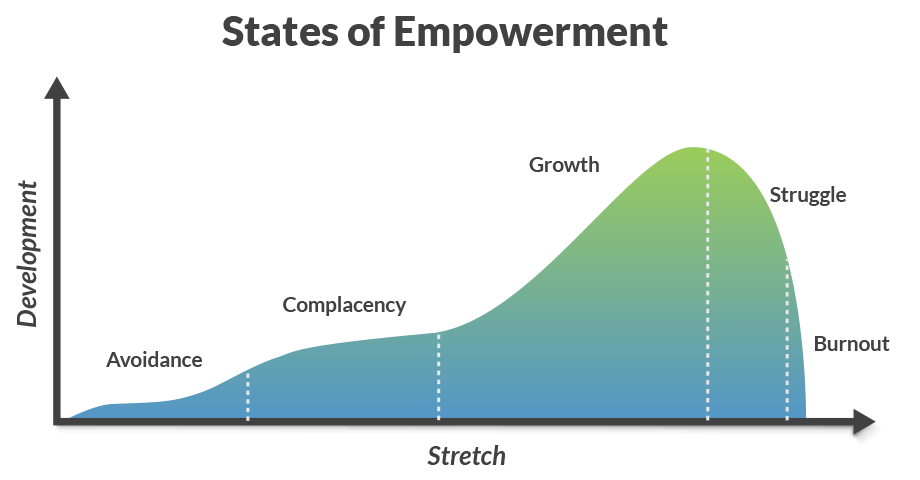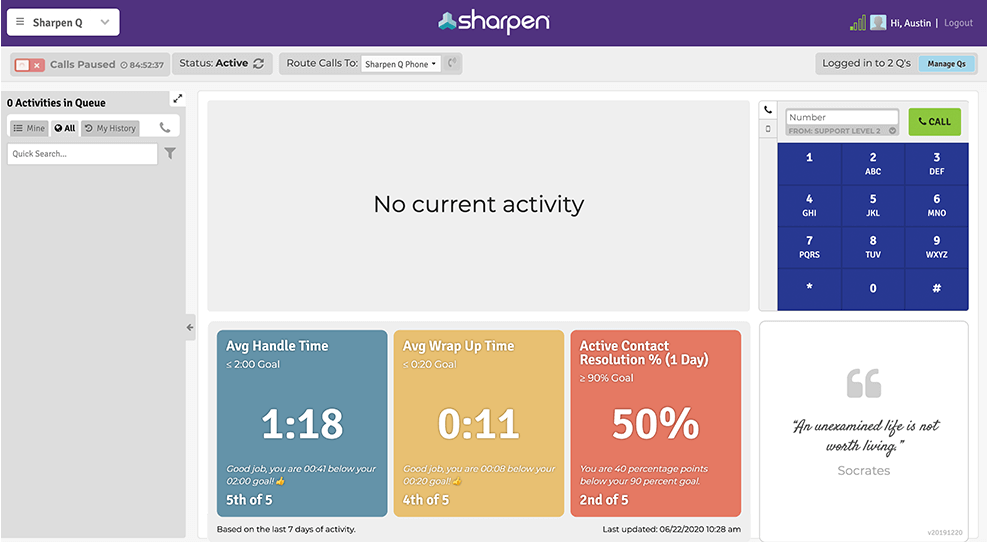
5 Ways to Manage the Performance of Apathetic Agents (and Why They Don’t Care if They’re a Good Customer Service Rep or Not)
As a manager, you own 70% of your employees’ engagement at work.
Your agents show up each day, plop down in their seats in the office or at home, and immediately start helping customers. And it’s up to you, manager, to keep them engaged in their role. To help them progress their careers. And, to motivate them to keep doing better for your customers.
But too often, managers drown in a sea of apathetic agents. Performance management is tough, no matter the circumstances. What’s worse, though? When you’re stuck trying to motivate team members who don’t care whether your customer experience is good or bad.
Download Now: Learn the 9 ways a better agent experience is good for business.
You crack down on metrics to drive up agent performance, but KPIs don’t budge. You monitor interactions to see where agents need help, but your performance plans don’t get them back on track.
What gives?
I keep tabs on a few forums where contact center agents share their frustrations (and successes) at work. My coworkers and I use these organic conversations to learn what matters to agents. These first-hand accounts help us feed info back into Sharpen to find solutions and improve their experiences at work.
But sifting through dozens of conversations, I’m baffled by some of the policies I see companies implement.
One agent asked peers how they handle back-to-back calls for 10 hours without going insane. She was scrambling to find 10 seconds between interactions to catch her breath.
Why? Because her company only allows agents to spend 6 minutes out of the queue. ALL. DAY. (Aside from the legally required 15-minute bathroom breaks and half-hour to scarf down a sandwich, of course).
And within 5 hours of posting her question, she had 64 responses. That many people felt compelled to answer and offer up advice. They’d been through it, too.
Too often, managers create efficiency-obsessed performance management plans for their team. Then, they get outcomes that don’t match their intentions: Irritated customers instead of satisfied ones. Exhausted agents instead of engaged agents.
I’d be apathetic, too.
When your agents have no energy or support, your customer experience suffers. So, how can you, manager, lend your support to help agents succeed? How can you create a performance management plan that turns apathy into empathy, putting positive customer experiences on repeat for your customers?
Let’s walk through five performance management techniques you can use to improve your agents’ experience at work, and your customers’ experience with your brand.
1. Recognize how your agents’ empowerment & engagement impacts performance
You can’t address challenges in your contact center without understanding them, first. Just like everyone has different motivators at work, people experience different states of empowerment at work, too. Some agents need little support and guidance, while others silently plead for you to step in and lend a hand. And with every state of empowerment your agent travels through, their attitude and performance at work changes.

It’s common for people to travel through all five stages of empowerment at some point in their careers. But three states in particular contribute to a higher sense of helplessness and apathy. Let’s dig into: Avoidance, Complacency, and Burnout.
Avoidance:
Avoidant agents inhabit your actively disengaged troop of agents. They aren’t all that interested in their role (read: apathy), and they certainly don’t work hard to meet KPIs.
What to do about it: Give avoidant agents clear performance expectations and direct challenges to motivate them at work.
Complacency:
Complacent agents do their work, but they’re average performers. They could be doing more to help your contact center reach your goals. They’re the clock watchers – taking interactions and going through the motions, with one eye on the clock waiting for their shift to end.
What to do about it: Ask probing questions in your 1:1s to learn what motivates these agents. Then, use those motivators as incentives to improve performance. For example, if an agent’s motivated by personal growth, set concrete goals to first improve performance, then foster that growth.
Burnout:
Burnt out agents once cared about their job and gave it their all, but they lost support and attention from management. They’re drained and depleted, leading them to check out and care less.
What to do about it: For one thing, cut them some slack. These agents need a vacation. And when they return, they need to know they have your support and attention to knock down problematic barriers.
Learn more about the 5 states of empowerment and why they matter to agent performance, over here.
2. Set goals together
Employees whose managers involve them in setting goals are 3.6x more likely to be engaged than employees who don’t have a hand in their goals, according to Gallup.
On the same side of the coin, another 63% of employees say they’ve wasted time at work because they didn’t have clear priorities. It’s tough to perform at your best if you don’t know what’s expected.
So, rather than following the traditional organizational hierarchy where leaders set standards, then ask teams to meet them, involve your agents in the goal-setting process.
Work with your agents to set and define the goals that matter most to your customer and business outcomes. Together, define what success looks like on the individual performance level as well as for your entire team. Then, drill down into specific objectives your agents can accomplish to reach each goal.
Breaking goals down into smaller pieces makes them less intimidating and more actionable. When agents have a hand in setting and defining their goals and objectives, they take more ownership in their roles.
3. Pair performance management with career development
When you have a tribe of apathetic agents, it’s important to ask yourself: Why would someone dedicate time and energy to an organization that doesn’t invest in them?
In exit interviews, some 40% of employees say lack of career development and growth are the most dissatisfying aspects of their job. In fact, researchers say it’s often the lever that catapults team members out the door.
To manage problematic attrition rates and boost agent performance, think past daily performance conversations. Weave conversations about growth and career trajectory into your performance management plan. In 1:1s with agents, make sure you or your supervisors’ step beyond KPIs and performance data to ask aspirational questions, too.
Address KPIs and how agents live up to the standards you set together. And, give them actionable feedback to improve. Then, once you’ve covered how they’re doing day-to-day, contemplate the long-term.
Ask questions like:
- If you could have anyone’s job in five years, whose would be?
- What do you love most about your current role?
- Do you feel fulfilled by the work you do?
- What are your measures of success?
Jumpstart conversations about your agent’s future, so they’re motivated to accomplish their goals on the clock and beyond. When you show agents you believe in their potential and you’ll help them reach future goals (even if they missed a KPI), apathy vanishes and well-being improves.

4. Tap into intrinsic motivation
Many people think motivation stems solely from performance-based raises or monetary incentives. But 120 years of research amalgamated by Harvard Business Review proves this isn’t always true.
The research found little connection between job satisfaction and job wages (so long as employees are paid fairly for their work).
To better manage agent performance, learn what motivates and drives each of your team members. If you have apathetic agents who don’t care about their job performance or your CX, ask, what do they care about?
Are they holding down a job to collect their next paycheck? Do they love the little moments when they make a person’s day? Or, do they show up to work for the sense of inclusion and community they feel on the call center floor?
Use your 1:1s, employee surveys, and impromptu conversations to put out feelers and grow your understanding of each agent. Learn their why. And once you know what matters to them, use it in your performance management plan.
If your agent, Tiffany, is going back to school for interior design and only working in a call center to pay rent, get creative with her role. Challenge her to meet her KPIs consistently for one week. And if she does, you’ll let her rearrange your common areas during her lunch break. Or, you’ll let her design the new desk layout to help your team safely head back to the office.
Seek out what matters to Tiffany, and incorporate it into her daily work as an incentive for better performance.
“When people feel inspired, motivated and supported in their work, they do more work — and that work is significantly less stressful on their overall health and wellbeing.”
– Ben Wigert, for Gallup
5. A competitive edge
A dose of healthy competition keeps your agents engaged and constantly striving to do better. Build performance management plans that use peer rankings and comparison to encourage higher performance.
If you have a host of agents who don’t care a ton about their KPIs and how they impact your CX, it might feel impossible to motivate them. But the reality is, that apathy likely stems from issues within your contact center or your company. Its origin isn’t your agent’s attitude about their own performance. Everyone wants to succeed.
Create individual performance dashboards to show agents how they’re doing each day, and how their daily performance stacks up against their peers. Tap into competitive motivation and the will to succeed.

With dashboards like these, agents can know at a glance how they’re performing against clear goals. They understand their progress toward each goal. And, they understand how each interaction they handle impacts those goals.
Not to mention, you can customize the information your agents see to support different types of motivation. Toggle the peer rankings off if the competition is getting too stiff. And, add in extra words of encouragement when your agents are nailing their metrics.
When you push and pull the right levers in performance management, you can transform even the most apathetic agents.
“If social media has any lessons to the contact center it is this: everybody wants to know that they are doing well. A happy agent is one who knows they are performing, and knows that others know it too.”
– Ric Kosiba, Chief Data Scientist at Sharpen, for SWPP

